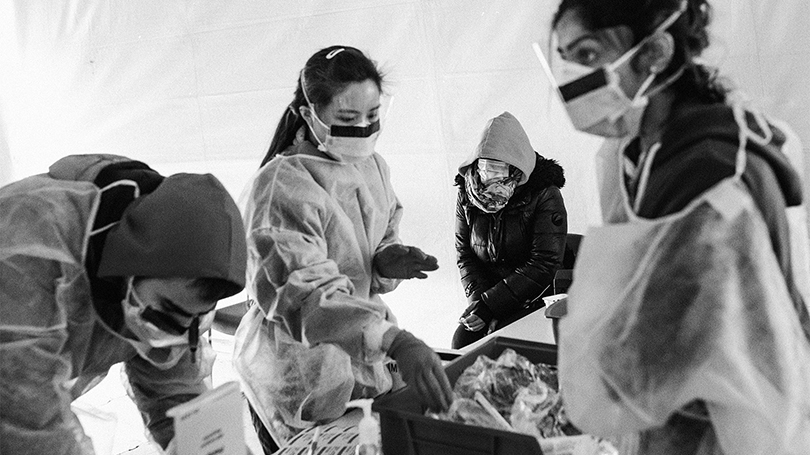
- About
- Undergraduate
- Graduate
- Foreign Study
- Research
- News & Events
- People
Back to Top Nav
Back to Top Nav
Back to Top Nav
Back to Top Nav
Back to Top Nav
Anthropology Associate Professor, Sienna Craig, has received funding for a project to address the rapidly unfolding health, humanitarian, and socioeconomic crisis of the COVID-19 pandemic among communities of Himalayan New Yorkers who live and work at the epicenter of the outbreak.
"Structural Inequality and Epidemiological Invisibility: Himalayan New Yorkers Respond to COVID-19" is a collaboration between Dartmouth College, The Endangered Language Alliance, and University of British Columbia.
Anthropology Associate Professor, Sienna Craig, has received COVID-19 Spark Award funding for a collaborative project between Dartmouth College, The Endangered Language Alliance, and University of British Columbia. "Structural Inequality and Epidemiological Invisibility: Himalayan New Yorkers Respond to COVID-19" seeks to address the rapidly unfolding health, humanitarian, and socioeconomic crisis of the COVID-19 pandemic among communities of Himalayan New Yorkers who live and work at the epicenter of the outbreak: the hardest-hit zone in the hardest-hit county in the United States with over 7,000 cases and hundreds of fatalities. So far, the most affected areas in New York are those that are most linguistically diverse. This fact calls for an examination of language use in messaging, comprehension, and cultural sense-making as well as an analysis of how structural inequality impacts information and disease transmission, behavior, and health outcomes.
Many of the approximately 40,000 Himalayan New Yorkers (from Nepal, Bhutan, northern India, China, and the Tibetan diaspora) are working in frontline spaces: grocery stores, transportation and construction services, healthcare, and childcare. However, akin to the ways that the coronavirus that causes COVID-19 remains "invisible" to the naked eye, the impacts of this disease on Himalayan New Yorkers may be obscured by their relative invisibility in immigrant New York – particularly within much larger Asian communities in the city. By connecting oral history diaries and ethnographic narratives of COVID-19 to a catalogue of public health messaging, social media reports, and existing language mapping data, how might we render visible a hard-hit community, including its vulnerabilities and its response? Professor Craig's project addresses an urgent and ephemeral need to document and understand how language and culture intersect with structural inequality to render a marginalized immigrant community, in a hyperdiverse urban context, "epidemiologically invisible" during a global pandemic.
The Himalayan New Yorkers COVID-19 project builds on long-term collaborations and relations of trust with members of the Himalayan New York community, and leverages existing networks of community research associates and engaged scholarship: an ongoing language mapping project, itself emergent from a Languages of New York map and related research; ethnography conducted with Himalayan communities, both in New York City and in home countries; and the Voices of the Himalaya video storytelling project, the crucial seed funding for which was made available through Dartmouth College, Office of the Provost Global Exploratory Grant.
With support from an anonymous donor, COVID-19 Spark awards are defined, short-term, high-impact research projects relevant to the current pandemic and its human and societal effects.